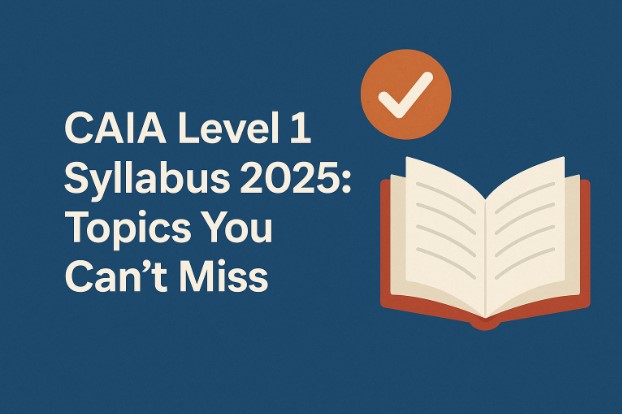
Blog
CAIA Level 1 Syllabus 2025: Topics You Can’t Miss

If you’re aiming for the CAIA Level 1, you’re in the right place. As a digital marketer with a decade of experience, I know the importance of clear communication and SEO impact, and this guide from Fintelligents delivers just that. You’ll get a fresh breakdown of the CAIA Level 1 Syllabus 2025, topic weightings, exam structure, eligibility, prep tips, and why Fintelligents is the smart choice to help you crack the exam.
Why the CAIA Exam Matters
The Chartered Alternative Investment Analyst (CAIA) credential is the benchmark for professionals in alternative investments, including hedge funds, private equity, real assets, structured products, and emerging digital assets. Globally and in India, CAIA is gaining a reputation as a powerful complement to a CFA or MBA.
CAIA Level 1 Syllabus 2025: Key Topics & Exam Weights
The updated 2025 syllabus focuses on real-world relevance in eight specialized areas. The breakdown below includes current topic weights for a better strategy:
| Topic | Details | Exam Weight |
|---|---|---|
| Professional Standards & Ethics | Ethical frameworks, conduct, and due diligence | 15–25% |
| Introduction to Alternative Investments | Asset class overview and classifications | 20–28% |
| Real Assets | Real estate, infrastructure, and commodities valuation | 11–17% |
| Private Equity | Deal lifecycle, fund structures, exits | 6–10% |
| Private Debt | Direct lending, mezzanine, distressed debt | 9–14% |
| Hedge Funds | Strategies (long/short, macro, arbitrage, event-driven) | 12–17% |
| Digital Assets | Crypto, tokens, blockchain custody, regulation | 4–8% |
| Funds of Funds | Manager selection, diversification, and fee layering | 2–6% |
Together, these eight areas create a robust understanding of the alternative investment landscape.
CAIA Exam Structure & Format
- Duration: 4 hours total (2 sessions × 2 hours, optional 30-minute break)
- Format: 200 multiple‑choice questions (100 per session)
- Coverage: Evenly distributed across the eight topics
- Focus: Analytical thinking, real-world application, and decision-making
CAIA Level 1 Eligibility Criteria
To take the exam, you must meet one of the following:
- Hold a bachelor’s degree or equivalent, OR
- Have at least 1 year of professional experience in finance, investments, accounting, or related fields
Bonus: The CAIA Foundation route is no longer mandatory, making your path simpler.
Preparation Strategy & Expert Tips
Get ready, smart with these proven strategies:
- Start early: Plan for 4–6 months with 250–300 hours of study.
- Weekly goals: Map each topic to calendar slots.
- Timed mocks: Practice under exam pressure, 2 minutes per question.
- Peer support: Join group mentoring for discussion and accountability.
- Topic focus: Give extra attention to Ethics & Intro to Alternatives, they carry the largest weight.
CAIA vs CFA
Considering CFA too? CAIA provides niche expertise in alternatives, a perfect complement to CFA’s broader investment scope.
- Check out Fintelligents’ comparison: CAIA vs CFA 2025
- Explore Indian career ROI: Is CAIA Worth It in India 2025?
Why Choose the Fintelligents CAIA Course
Enrolling with Fintelligents gives you access to:
- Industry-expert instructors with real experience
- Curriculum fully aligned with the 2025 syllabus and exam weightings
- Mock exams, case-based discussions, and one-on-one mentorship
- Peer learning forums for shared insights and motivation
Final Thoughts & Call to Action
The CAIA Level 1 Syllabus 2025 covers eight critical alternative investment topics from ethics to funds of funds, each with defined weightings. Success is built on strategy, consistent effort, and expert help.
Ready to level up?
Enroll in Fintelligents’ CAIA course now and embark on a path to mastery in alternative investments!
FAQs
Q: What does the CAIA exam demonstrate?
A: Industry-recognized expertise in alternative investments, enhancing credibility and complementing CFA/MBA credentials.
Q: What topics are covered in CAIA Level 1?
A: Ethics, Alternatives intro, Real Assets, Private Equity, Private Debt, Hedge Funds, Digital Assets, Funds of Funds.
Q: How should I prepare?
A: Start early, use structured plans, practice timed mocks (~72 sec per Q), apply memory aids, and join study groups.
Q: How many study hours are recommended?
A: Plan for 250–300 hours over 4–6 months of consistent study.
